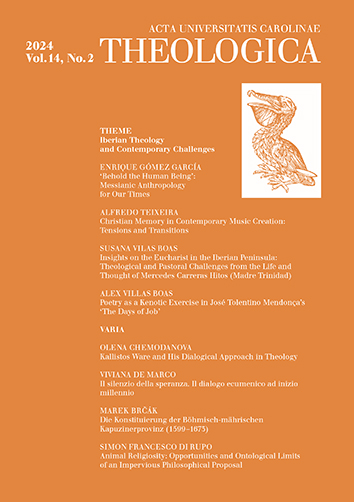AUC Theologica je recenzovaný odborný teologický časopis, který vychází dvakrát ročně. S výjimkou slavistických témat, recenzí a zpráv zveřejňuje příspěvky pouze ve světových jazycích – v angličtině, němčině, francouzštině a italštině.
Časopis se zaměřuje na širokou škálu teologických disciplín, jako je například systematická teologie, biblistika, patristika, pastorální a spirituální teologie, katechetika nebo církevní historie. V rámci nich se snaží reflektovat současná témata, která často vyžadují interdisciplinární přístup. Vítáme také teologické články, které se dotýkají jiných akademických oborů, jako je například filosofie, sociologie, literární věda či vědy přírodní.
Každé číslo se skládá ze dvou sekcí. Tematická sekce obsahuje články s jednotným zaměřením. V sekci s názvem „Varia“ publikujeme původní studie na různá aktuální teologická témata. Všechna čísla časopisu jsou dostupná v režimu Open Access.
AUC THEOLOGICA, Vol 10 No 2 (2020), 41–53
On friends and false friendship in the poetry of Gregory of Nazianzus
Erika Brodňanská
DOI: https://doi.org/10.14712/23363398.2020.57
zveřejněno: 02. 02. 2021
Abstract
Unlike family relations, friendships are based primarily on deliberate personal decisions. In some cases, however, they can be marked not only by sympathy and positive emotions but also by opportunism and conflicts. The relationship between two Church Fathers and close friends, St. Gregory of Nazianzus and St. Basil the Great, went through a whole range of emotions. A portrayal of this relationship, as well as several others (e.g. the one with Maximus the Cynic), is to be found in St. Gregory’s autobiographical poem De vita sua. Some details on the saint’s friends can also be perceived from his letters in verses, addressed to a group of more or less close friends from his surroundings. The variety and seriousness of the matters that St. Gregory discusses in these texts mirror the depth or superficiality of each particular relationship. In his letters in verses, Gregory of Nazianzus asks his friends for special favours (e.g. Hellenius), praises their deeds (e.g. some members of the monastic community in Caesarea), encourages them (e.g. Nemesius) or reprimands them (e.g. Vitalianus). A significant indicator of the level of friendship with the persons involved is the way St. Gregory addresses them. The salutations he uses are often very courteous, but in a couple of cases, marks of enmity can be found as well.
klíčová slova: Gregory of Nazianzus; Poetry; Friends; St. Basil the Great; Cynic Maximus; Peraequator Hellenius

On friends and false friendship in the poetry of Gregory of Nazianzus is licensed under a Creative Commons Attribution 4.0 International License.
148 x 210 mm
vychází: 2 x ročně
cena tištěného čísla: 100 Kč
ISSN: 1804-5588
E-ISSN: 2336-3398
